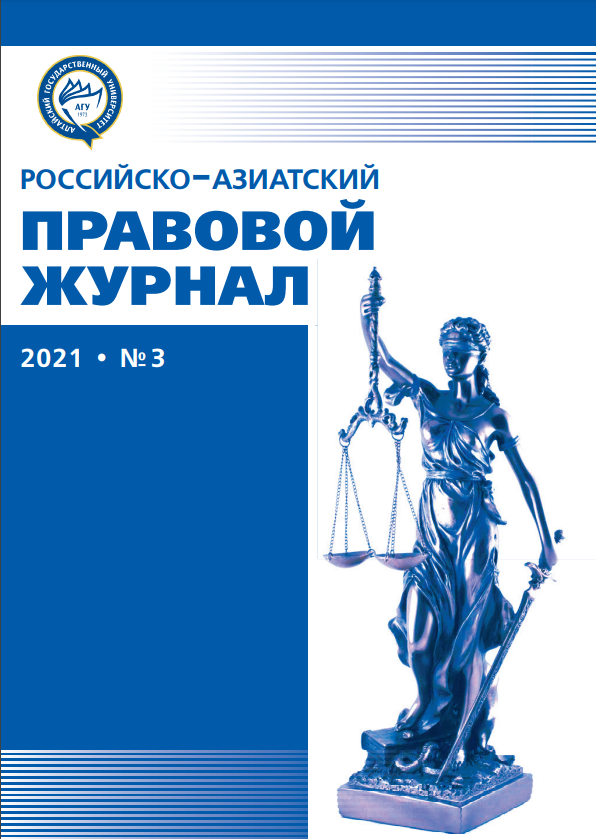DIGITAL CURRENCY AS A SUBJECT OF CRIME AND A MEANS OF COMMITTING CRIMES
УДК 343.378 ББК 67.408.122
Abstract
In this article, the author examines the issues of the criminal legal status of digital currency as an objectand as a means of committing a crime. In 2020, a special Federal law was adopted defining the legal status ofdigital assets, as well as amendments were made to the Civil Code of the Russian Federation concerning theestablishment of the legal status of cryptocurrency or digital currency in the terminology of these regulationsas an object of civil rights. Significant changes in the civil legal regulation of cryptocurrencies have led to achange in approaches to assessing the criminal legal status of virtual money. In particular, the recognitionof digital currency by other property has allowed solving a number of qualification issues, but until now,criminal law is very cautious about the official recognition of cryptocurrency as the subject of a crime. Theauthor of the work offers options for the qualification of crimes committed using digital currency, in theabsence of changes in the criminal law and explanations of the Highest Court.
Downloads
References
О криптовалютах. URL: https://iamforextrader.ru/skolko-vsego-sushhestvuet-kriptovalyut/ (дата обращения: 05.09.2021).
Сколько всего существует криптовалют. URL: https://internationalwealth.info/cryptocurrency/ cryptocurrency-regulation-in-2020-in-different-regions-europe/ (дата обращения: 05.09.2021).
Her Majesty’s Revenue and Customs, Управление Её Величества по налогам и таможенным пошлинам). URL: https://nesrakonk.ru/hm-revenue-and-customs-hmrc/ (дата обращения: 05.09.2021).
Как в разных странах регулируют криптовалюту: обзор законов в 2020 г. URL: https://habr.com/ru/company/moneypipe/blog/523354/ (дата обращения: 05.09.2021).
Абрамова Е.Н. К вопросу о понятии криптовалюты: проблемы терминологии и формирования дефиниции // Банковское право. 2021. №2. С. 23–27.
Шарапов Р.Д., Минин Р.В., Капаева Е.О. Криптовалюта: уголовно-правовой аспект // Юридическая наука и правоохранительная практика. 2018. №2. С. 43–49.
Маслакова Е.Е. Предмет преступления как форма выражения общественных отношений // Ученые записки Орловского гос. ун-та. Серия: Гуманитарные и социальные науки. 2015. №1. С. 257–261.
Уголовное право Российской Федерации. Общая часть: учебник / Ю.В. Грачева, Л.Д. Ермакова, Г.А. Есаков и др. ; под ред. Л.В. Иногамовой-Хегай, А.И. Рарога, А.И. Чучаева. 2-е изд., перераб.и доп. М. : КОНТРАКТ; ИНФРА-М, 2008. 600 с.
Информационное сообщение Росфинмониторинга от 6 февраля 2014 г. «Об использовании криптовалют». Документ опубликован не был // СПС «КонсультантПлюс».
Коренная А.А., Тыдыкова Н.В. Криптовалюта как предмет и средство совершения преступлений // Всероссийский криминологический журнал. 2019. Т. 13. №3. C. 408–415.
Russian-Asian Law Journal is a golden publisher, as we allow self-archiving, but most importantly we are fully transparent about your rights.
Authors may present and discuss their findings ahead of publication: at scientific conferences, on preprint servers, in public databases, and in blogs, wikis, tweets, and other informal communication channels.
Russian-Asian Law Journal allows authors to deposit manuscripts (currently under review or those for intended submission) in non-commercial, pre-print servers such as ArXiv.
Authors who publish with this journal agree to the following terms:
- Authors retain copyright and grant the journal right of first publication with the work simultaneously licensed under a Creative Commons Attribution License that allows others to share the work with an acknowledgement of the work's authorship and initial publication in this journal.
- Authors are able to enter into separate, additional contractual arrangements for the non-exclusive distribution of the journal's published version of the work (e.g., post it to an institutional repository or publish it in a book), with an acknowledgement of its initial publication in this journal.
- Authors are permitted and encouraged to post their work online (e.g., in institutional repositories or on their website) prior to and during the submission process, as it can lead to productive exchanges, as well as earlier and greater citation of published work (See The Effect of Open Access).








